Have they found the lost city of Atlantis at last?
Was Atlantis a real place or just a fictional story? Where might it be located? Many have searched for the location of the lost city where a powerful civilization lived.
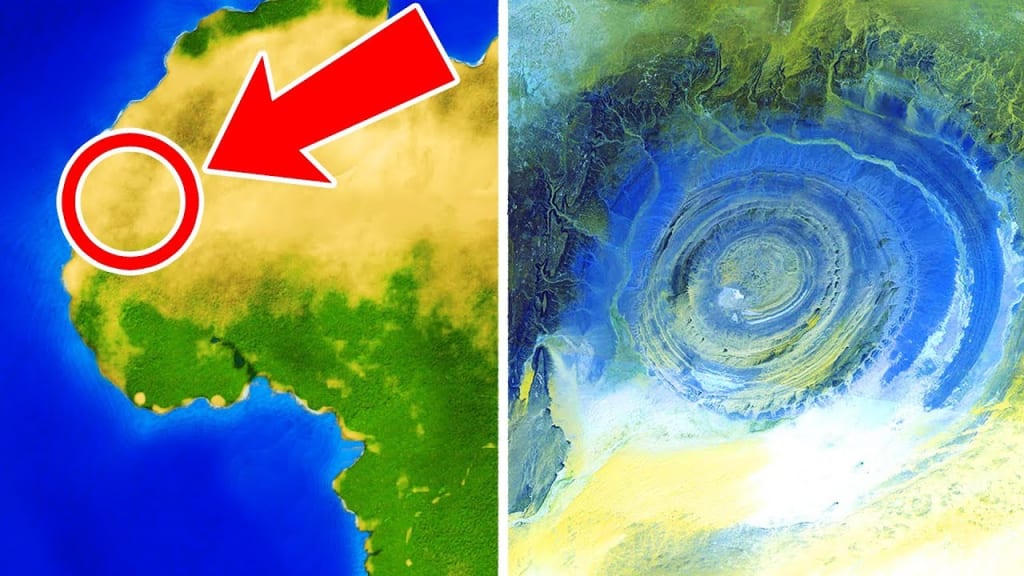
Did they really find the lost city of Atlantis? And by the way who are they keep talking about? We need to find out who the heck they are? Anyway, once again, I digress, stay with me here.
An extraordinary island home to a powerful civilization sunk to the bottom of the sea by a mighty earthquake. The story of Atlantis still fascinates us over 2000 years after it was written.
Was Atlantis a real place or just a fictional story?

Some believe that it really did exist, others say it was simply a myth and there are those who believe that some parts of the story were based on fact. Nonetheless, many have searched for the location of the lost city, but could they have been looking in the wrong place all this time? Maybe!
A recent report claims to have discovered the true location of Atlantis and it's nowhere near you'd expect it to be. All right the legend of Atlantis! Let's review how the story actually goes?
The idea of Atlantis was conceptualized by the Greek philosopher Plato, who wrote about it in two of his works; Timaeus and Critias. In Plato's writing the story goes like this...
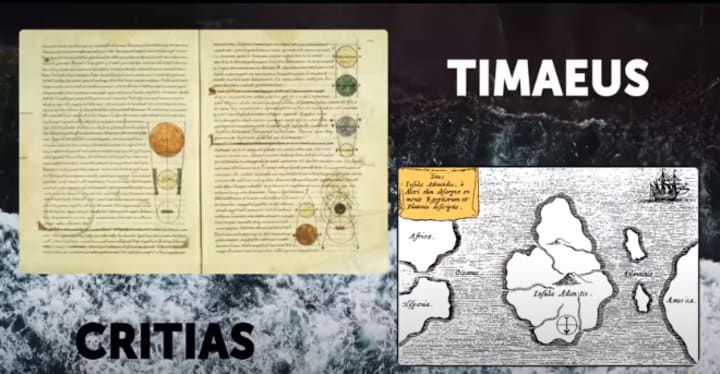
Socrates met with three men; Timmius of Locre, Hemocrites of Syracuse and Critias of Athens, in order to find out how Athens had interacted with other states in ancient times? That is when Critias stepped forward and told him a story. Now bear with me here because it's sort of like a herded through a grapevine type of situation.
Critias had heard about it from his grandfather, who had heard from the poet Solon, while the latter was in Egypt. There Solon talked to the priest, who spoke of a legendary battle involving Egypt and Athens. Still following this, I didn't lose you? Okay!
Athens was an extraordinary island in the Atlantic ocean, as for the main city located there its peculiarity was that it had concentric rings that alternated between water and land. The city was beautifully designed, had extravagant architecture, was home to kings and a strong military force and was overall a marvel to behold. To top things off it also held an abundance of precious metals, gold and silver.
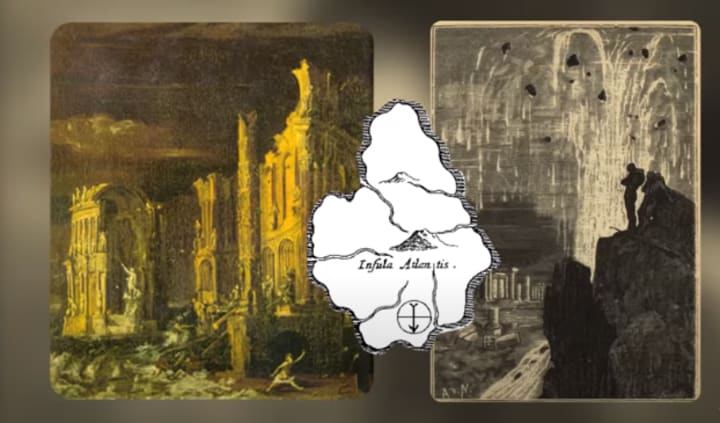
Systematic diagram of the Lost city of Atlantis 🔰
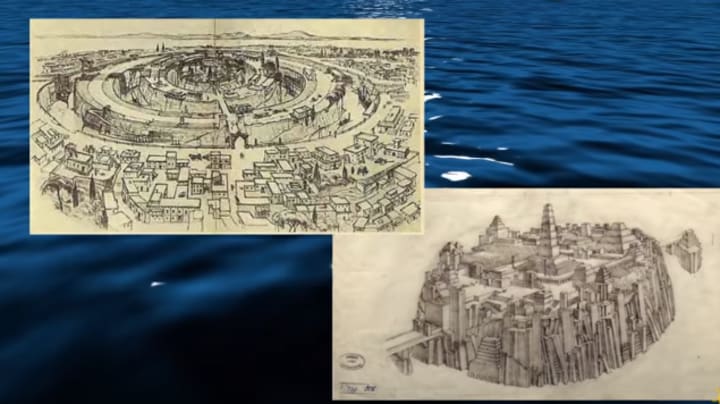
For some unknown reason Atlantis decided to rage war on the remainder of Asia and Europe, the only one to try to defend themselves against such a powerful enemy was Athens, who took on the Atlantean forces and defeated them. Thus proving that Athens was actually superior to other states. Atlantis, having failed, fell out of favor with the deities, who destroyed the ancient civilization with massive earthquakes and floods that eventually sank the entire island into the sea. In essence The Legend of Atlantis tries to show that Athens was the most powerful state.
It's a story about a small but peaceful city, Athens, that triumphs over a powerful but corrupt one Atlantis. So the story certainly works as a tale about human greed and corruption and the power that a small but just nation can hold over a tyrant.
Was Plato just telling a tale!
Was Plato just telling a tale, albeit a moral one? Or still just a story or was he referring to actual historical events. According to Plato, the story came from about 9000 years before his time and has been passed down by poets and other storytellers. This point does support the idea that Atlantis was never based on true events. If the story had indeed been around for about 9000 years before Plato's time, chances are someone else would have written about it. However, Atlantis was only described in Plato's works.
Another aspect to consider is the way the story was told. It was the tale that was passed down from generation to generation, from Egyptian priests to Solon to Critia's grandfather, to Critias himself and finally to Socrates. If the story was real, information is bound to be lost, misinterpreted or changed in some way. Through word of mouth a story can morph to such a point that the final person to receive it might have a completely different tale. Since the grapevine is such an unreliable source, if the story was real there's no way of knowing, what the original plot might have looked like? But this glitch isn't enough to say Atlantis was made up entirely. Maybe there were aspects of the story based on real life.
There are some theories that support the existence of Atlantis. According to Robert Ballard, the ocean explorer, who discovered the wreckage of the Titanic ship, the story of Atlantis makes sense because similar things have happened to other civilizations. Throughout history there have been cataclysmic floods, earthquakes and volcanic eruptions. Nearly 3,600 years ago a volcanic eruption wreaked havoc on the island of Santorini in Greece, bringing an end to the ancient Minoan civilization. Some believe that Plato's Atlantis is based on the loss of the Minoan people. So, it's reasonable to say that if the situation occurred with the Minoan civilization, it could have happened to Atlantis too.
If the island was real there are so many theories about its original location. Some have said it existed under Antarctica on the coast of Spain or somewhere in the Mediterranean. Plato himself wrote that there was an island situated in front of the straits. The straits he was referring to are believed to be the straits of Gibraltar, The waterway separating Europe from Africa. However, there hasn't been any evidence in that area of a lost city. Perhaps the location of Atlantis has been hidden in plain sight not too far off from the strait. People have searched for it, expecting it be buried in the sea, but could remains of Atlantis be sitting right in the middle of the Sahara desert?
The Richat structure, casually as the eye of the Sahara, is a circular formation in the earth located in northwest Africa, in the country of Mauritania. If you look at the pictures that depict what the city of Atlantis might have looked like and compare them to the Richat structure. You can't deny the similarities. If you were to walk the Richat structure, chances are you wouldn't be able to tell that it has the same concentric circles as the one described for Atlantis. You need a different perspective to spot those.
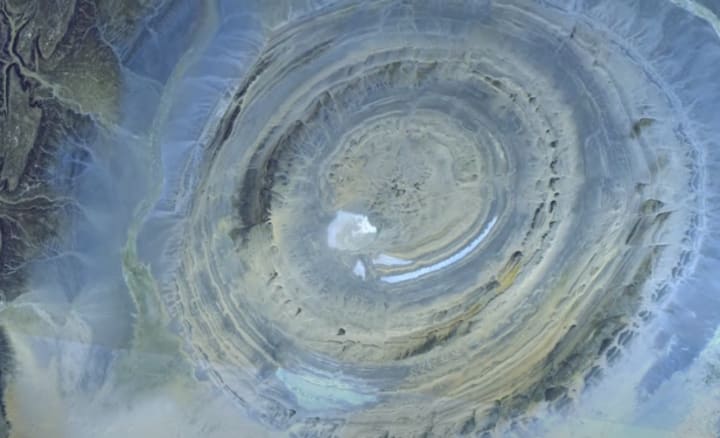
The below image shows the resemblance between the Richat structure and the Atlantis structure 🔰
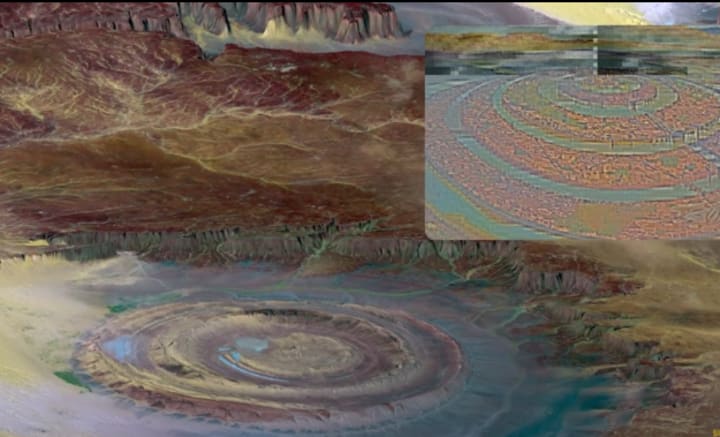
In fact, most people didn't even know about the Richat structure until it was seen from space. The crew of the Gemini 4 spacecraft in 1965, saw it from above and took pictures of the site. Once you get the perspective from space, you really start to wonder, perhaps this is where Atlantis has been hiding the whole time.
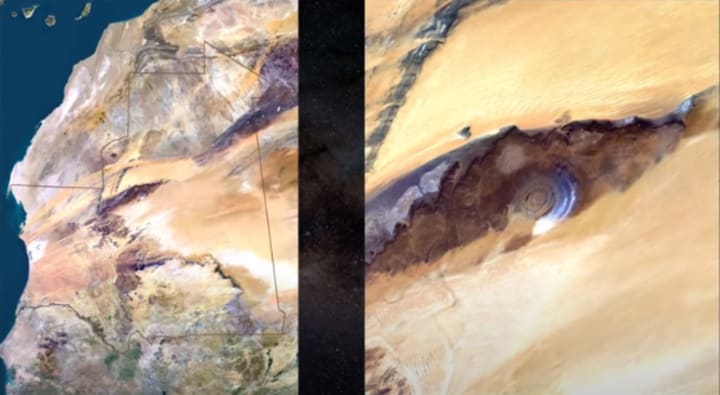
To add to this theory, the Richat structure is close to the size that Plato gave to the city of Atlantis in his works. Plato wrote that Atlantis was 127 stadia in diameter. Now there are different ideas on how to interpret ancient units of measurement, but most sources put one stadium equal to anywhere from 607 to 630 ft (185M TO 192 M). So, 127 stadia will be about 15 miles. As for the Richat structure, scientists have put its diameter at roughly 25 miles (40 Km). Sure! That's a far cry from 15 (24 Km), But get this: The inner circle is 19 miles (30.5 Km) across. Again, it's not exactly 15 miles, but don't forget these all rough estimations. We don't know Plato's exact calculation and we can do only our own educated guesses nowadays as to the size of Richat structure. It's not like you can across this thing with a tape measure and get the exact amount, but hey! Let's try who's got a 25 mile tape measure? Nobody!
Okay, besides the circles within the circle's formation and similar sizes, another argument is that Plato describes the city located with beautiful mountains to the north and there's a mountain range in the north part of the Richat structure.
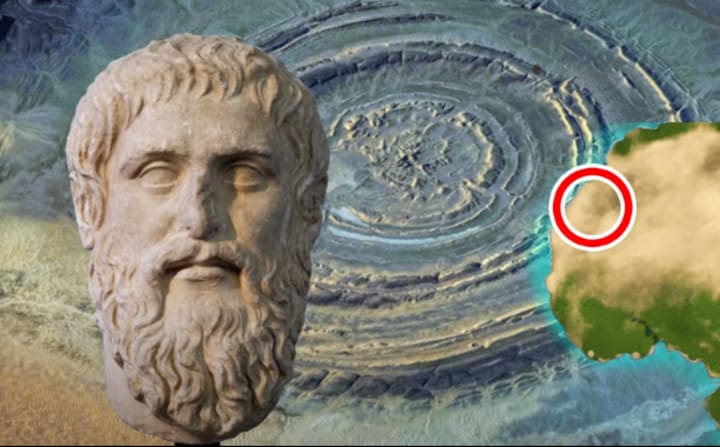
You might be wondering how an island could be sitting in the desert and not deep at sea? Let's look at Plato's own words for this, he wrote that Atlantis became no longer accessible by ship. So, does this necessarily mean it sank to the depths or could we interpret these words as Atlantis becoming part of a regular piece of land, losing its island status. To support this claim is the fact that the Richat structure is deeply eroded, meaning that a great amount of water must have created the formations that currently stand. Pictures of the coastal area of the region show what looks like water formations going from the coast to where the Richat structure now stands.
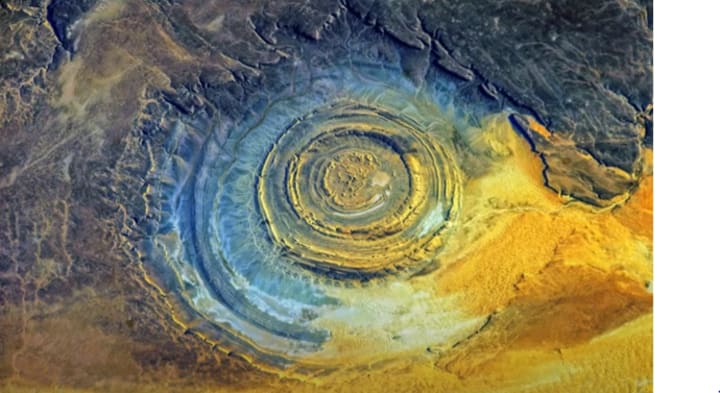
So, basically instead of the lost island sinking deep into the waters, it actually could have risen from them. It's a pretty thought-provoking theory, but that's all it is a theory without any hard evidence.
About the Creator
Zeeshan Mushtaq Lone
I'm a student and I also have conducted a marketing survey with ITC Limited. Multinational conglomerate company.





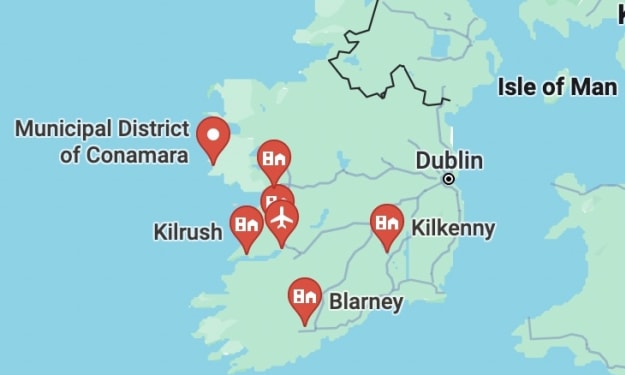
Comments
There are no comments for this story
Be the first to respond and start the conversation.